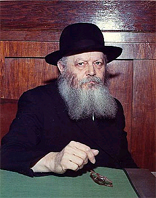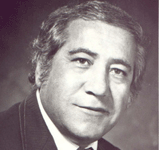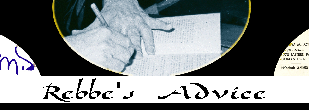Home
Letters
Article
Pictures
Soul Meetings
About
Contact
 |
 |

A request
from the Rebbe
" The Rebbe's Imprint on America"
The
Rebbe requests a present from Mr. David Chase in honor of his birthday,
too put on Tefillen daily.
Dr. David Tuvia Chase
Greeting and Blessing:
On the occasion of the forthcoming Yom-Tov Pesach, I send you my prayerful
wishes that the festival of our freedom bring you and yours true freedom,
freedom from anxiety material and spiritual, from anything which might
distract from serving G-d wholeheartedly and with joy, and to carry
over this freedom and joy into the whole year.
Wishing you and yours a Kosher and happy Pesach,
With blessing [sig.]
P.S. It was a pleasure to see you at the Farbrengen on the occasion
of the 11th of Nissan, and exchange l’chayim blessings.
Although it is not customary nor proper to ask for a birthday gift,
but considering our special relationship, I venture to do so, being
confident that you will treat it in the proper spirit.
The birthday gift that I have in mind, which I would consider an honor,
as well as a great pleasure, is that you devote a quarter of an hour
of your time every weekday morning and dedicate it for the sacred purpose
of putting on Tefillin, with the appropriate prayer that goes with it,
such as the Shma and the like. The latter need not necessary be recited
in Hebrew. If you can manage this in ten minutes, I am prepared to forego
five minutes and let it be only ten minutes of your time.
In addition to the thing itself, being one of the greatest Mitzvoth,
as our Sages said that the whole Torah was compared to it, the Mitzvo
of putting on Tefillin on the left arm, facing the heart, and on the
head, the seat of the intellect, has the special divine quality of purifying
the heart and the mind, emotion and reason, and bring them into the
proper balance and harmony. While this is important for every Jew, it
is certainly of special significance to one whose activities normally
involve a great deal of mental and emotional strain, and it is highly
important to have them in proper balance for the utmost degree of efficiency.
The above is of additional significance in your case as chairman of
the board of the Rabbinical College of America, in which you have had
such remarkable Hatzlocho, with G-d’s help, and have been able
to involve many others to follow in your footsteps. Thus, this “birthday
gift” would also have a salutary impact on the Rabbinical College,
Its administration and students, and further widen the channels for
all concerned to receive G-d’s blessings materially and spiritually.
I trust that you put on Tefillin every morning in any case, and the
reason I am asking the above is only that you should make it a definite
point on your calendar, to make sure that your preoccupation with your
personal business and the business of the Rabbinical College would not
distract you even once to overlook the putting on of the Tefillin. And
this will be my reward.
P.P.S. Although in matters of the Rabbinical College, I usually send
a copy to our distinguished mutual friend Rabbi Moshe Herson, I am not
sending him a copy of this letter, considering its very personal nature.
I leave it to you whether you wish to show it to him.
~*~
Mr. David Chase’s response to the Rebbe’s letter, Requesting three pair’s of Tefillin. And with an interesting question.
Dear Rabbi,
I am in receipt of your letter dated 12 of Nissan, 5741. After reading
the text of the letter, I was over whelmed by a feeling of joy, pride
and humility.
Your reference to our special relationship, your request for a birthday
gift, had a most profound effect on me and I hasten to report to you
that I proceeded to put on Tefillin in my morning prayers the very next
day.
Since this occasion will no doubt change my whole course of life, I
will beg your forgiveness for being presumptuous in requesting a birthday
present of you.
I will be most honored and privileged if you should obtain for me through
your auspices, three sets of Tefillin. One which I will use in my northern
home, one for my southern residence and one (a small set) to carry while
travelling.
Since I am asking for a gift and yet I do not want to deprive someone
from a material necessity which he or she may need much more than I
do, I will include with this letter, and with your permission, a check
for $1800. The $1800 is “Chai”, and references my prior
statement of a new direction in my life.
Your letter was read and re-read by me several times, and two things
came to mind. One, the biblical statement by our forefather who uttered
the comment of I knew my son, I knew, which I interpret to mean that
not only did our forefather direct his thoughts to the recipient of
his comment but he also knew well the person he was talking to.
My spontaneous response to your request paralleled this biblical episode
and my comment of (“Please forgive my presumptuousness) “I
knew my father, I knew".
My second thought and again, for the third time, I will beg your forgiveness
for my presumptuousness is purely in the form of a question which, if
you would be kind enough, I would like an answer to.
Your letter is composed in two parts. One part makes reference to your
blessing on occasion of Yom-Tov Pesach and for which I and my family
are most grateful.
The second part consists of a P.S., which makes reference to your request
of a birthday gift and to my putting on Teffilin. If I may paraphrase
your letter, that “the putting on of Tefillin is as our Sages
said that the whole Torah was compared to it, the Mitzvo of putting
on Tefillin on the left arm, facing the heart, and on the head, the
seat of the intellect, has the special Divine quality of purifying the
heart and the mind, emotion and reason, and bring them into the proper
balance and harmony.”
In my humble opinion then, the second part of your letter has much greater
significance than the first part. Why then was that portion which carried
so much substance included under P.S. rather than at the first portion
of the letter?
Dear Rabbi, I am dictating this letter on the third day of my putting
on Teffilin, and I guess perhaps that my curiosity in prying into what
could be just pure circumstance is looking to an intellectual or preconceived
reason, and based further on the statement in your letter that the head,
the seat of the intellect, has the special Divine quality of purifying
the heart and the mind, emotion and reason, is instrumental in my asking
these questions.
In conclusion, I am most grateful for your letter and I will do my best
not to overlook putting on Teffilin in the future.
May the Al-might bless you with continued good health and well being
and may you continue to spread wisdom, kindness and good will1ess to
your constituency,
Gratefully yours,
David Chase
~*~
The Rebbe’s response
Dr. David Tuvia Chase
Greeting and Blessing:
Many thanks for your letter of June 24, with enclosures. I should have
acknowledged it immediately, except that I was waiting for the Tefillin,
which are accompanied by this letter.
Needless to say, since the Tefillin are a gift, my first thought was
not to cash the check. I decided, however, that when a Jew desires to
give Tzedoko [=charity], he should be encouraged, not deprived of the
Zechus [=merit] of it. Accordingly, I have earmarked it for a sacred
cause, as per enclosed receipt. May the Zechus of the Tzedoko bring
you and yours additional blessings from HaShem [=G-d] in all your affairs,
particularly in the matters about which you wrote with such heartfelt
sentiments, of which more is no doubt contained in between the lines.
Now, to answer your question in reference to my previous letter, namely,
why the Pesach blessings came first, and the subject of the Tefillin
second, and in a P.S.
The answer, in plain terms, is that the subject of Pesach had precedence
because of its specific timeliness. Moreover, it was entirely within
my prerogative, whereas the matter of Tefillin was a request on my part
and depended on your good will and resolve.
In a more significant sense (which will also explain the P.S. instead
of a separate letter on such an important subject as you well recognize)
the order corresponds to the Torah, where the Mitzvah of Tefillin is
introduced in connection with, and following, the exhortation concerning
the remembrance of Yetzias Mitzrayim [=the going out of Egypt] and the
annual celebration of Pesach. Thereupon the Torah declares: “And
it (Yetzias Mitzrayim) shall be for a sign unto you on your hand and
for a reminder between your eyes, in order that G-d’s Torah be
in your mouth; for with a strong hand Hashem brought you out or Mitzrayim
(Exod. 13:9).
In this section (Exod. 13: 1-10), which is one of the four Parshiyos
[=chapters] contained in the Tefillin “houses,” the Torah
emphasizes that although Yetzias Mitzrayim is to be celebrated annually
in the spring month for seven days (eight in the Diaspora) as Chag HaMatzos
[the holiday of Matzos], the event should be remembered every day in
a tangible way, through the Mivtzah of putting on Tefillin, what is
the connection?
As I mentioned in my previous letter, it is explained in our sacred
sources, especially in Chabad, that the putting on Tefillin stimulates
the proper balance of harmony between the heart and the mind, emotion
and reason. This is the Way a person can overcome his natural constraints
(his “inner Mitzrayim” = constraints, boundaries) –
constraints which an imbalance between the emotional and intellectual
faculties would further aggravate.
The terms “balance” and “harmony” imply a blend,
not the exclusion of one or the other. Emotions uncontrolled can drive
the person to extremes, while pure intellect is by nature completely
detached and “cold,” lacking vitality. Only when the two
are blended in the proper balance, the person attains inner harmony
and can function most efficiently and productively. Such a person is
inwardly unfettered and spiritually free.
It may be wondered how these two opposites and contrary paramount human
faculties, personified by the brain and heart, each called a “sovereign”
organ ruling all the other organs of the body, can be reconciled and
brought into true and everlasting harmony.
The answer is that the creator has given man the capacity to achieve
such harmony, and He has made certain that the Jewish people, who had
been chosen to receive the Torah and spread the light of G-dliness on
earth, would have the wherewithal to achieve this balance and harmony
through the Torah and Mitzvos, particularly the Mivtzah of Tefillin.
The historic event of Yetzias Mitzrayim brought freedom to our Jewish
people from Bondage, both physical and spiritual, through the attaching
of themselves to HaShem and His servant Moshe, culminating the Kabbolas
Hatorah [=the receiving of the Torah]. It is the forerunner and counterpart
of the personal “Yetzias Mitzrayim” of every individual
Jew. This is why the Mivtzah of Tefillin is of central in Jewish life.
To conclude with a prayerful wish based on the Torah principle that
“G-d’s reward is in kind, but in a most generous measure.”
When a Jew makes the effort to brake through his natural limitations,
and succeeds with HaShem’s help, His blessings come in a similar
manner, transcending the natural order, so that the Parnosso [=livelihood]
exceeds all expectations, one’s health and vigor is inordinately
better than the birth certificate would normally indicate, and so on.
May this be so with you and yours in the fullest measure.
With esteem and blessing
[Sig.]